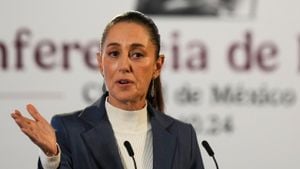The 2024 United States General Election, held on November 5, showcased the country's political dynamics through various contests at both state and national levels, with California and Washington drawing significant attention not just for their pivotal votes on the presidency but also for state-specific issues. This multifaceted election served to highlight the ever-evolving sentiments of the electorate, reflecting both challenges and hopes for the American populace.
Looking at the presidential race, Kamala Harris, the Democratic candidate, found herself pitted against notable figures, including Donald Trump, Robert Kennedy Jr., and Jill Stein. Each candidate carried unique messages and proposed varied policy approaches on issues ranging from economic recovery to climate change, which played significantly during their campaign trails. Voters across the nation faced the choice of reinforcing party lines or venturing toward independents, showcasing their readiness to adapt based on candidates' stances rather than strict allegiance to party ideologies.
California, the most populous state, was sizzling with political heat as voters engaged not only with the presidential elections but with Proposition 33 which aimed to expand local rent control. On the other hand, statewide sentiments indicated clear resistance to such measures. Following the third rejection of statewide rent control, many were quick to express discontent over the rising cost of living and housing shortages faced throughout the state. Supporters of Proposition 33, including various advocacy groups, argued fiercely for the need for affordable housing, but as the numbers came in, the proposition failed overwhelmingly with 61% against. This outcome left many pondering the next steps for how to alleviate California's housing crisis.
"It’s disappointing to see this failure, particularly since many believe affordable housing is necessary," commented Chris Melody Fields Figueredo, the executive director of the Ballot Initiative Strategy Center. She pointed out the backlash against misinformation during the campaign, which added to the hurdles faced by proponents of rent control measures.
The recent vote signaled to both supporters and detractors of rent control policies about the complexity of the housing issue within California. Alexandra Alvarado, from the American Apartment Owners Association, underscored this complexity, asserting it reflected Californians' current appetite against sweeping rent control measures statewide. "Those who are deeply supportive of rent control aren’t likely to stop trying to push for reforms," she added, indicating the continued efforts at local levels are likely where we will see future progress.
On election day, California wasn't just focused on rent control; there's also growing discourse around issues like crime and public safety, education funding, and healthcare. Many voters participated enthusiastically, seizing the opportunity to voice their opinions on ballot propositions aimed at amending policies affecting public education and environmental regulations. Proposition 2, for example, sought to issue public education bonds, indicating the electorate's prioritization of educational issues.
Meanwhile, up north, Washington was matching California's fervor, holding its own share of heated elections. Kamala Harris and Donald Trump were leading the charge for the presidential election, leading candidates field campaigns brimming with promises aimed at rejuvenation and national cohesion. Simultaneously, Washington voters were faced with local measures, such as the enforcement of carbon tax credit trading, which tapped deeply on environmental awareness and the necessity for climate-resilient policies.
The Washington election results were reflective of voter enthusiasm, with citizen participation levels soaring. Local calls for environmental responsibility held significant sway as various measures were hotly contested from the state’s legislature down to the county level. Among the notable measures was Measure 2117 — one aimed at prohibiting carbon tax credit trading, which drew clear community interest highlighting the dual focus of voters on economic growth balanced against environmental sustainability.
A breakdown of the voting revealed widely contested races for congressional districts, showcasing the competitive nature of elections at every level. Voter engagement appeared revitalized, signifying citizens' investment not just federally but locally, eager to influence policies impacting their neighborhoods directly.
Looking at the governor's office, Washington voters were also challenged with selecting either incumbents or challengers who set differing paths on handling the state's economy and policies surrounding healthcare and public safety. The echoes of voter dissatisfaction over quantitative measures like crime rates highlighted how deeply personal local issues affected the citizen's voting patterns as communities grappled with their safety and livelihoods.
Undoubtedly, the 2024 General Election encapsulated complex narratives woven around economic, environmental, and socio-political themes, illustrating vibrant civic engagement from coast to coast. The nationwide response underscored varied voter sentiments, with some eagerly throwing support behind ambitious changes, others opting for stability and the status quo as reflected in the struggles over propositions concerning rent control, crime rates, and environmental regulations.
Voter sentiments echo broader issues seen through the prism of individual choices being made throughout the states. More than just mere results of ballot tallies, the outcomes symbolize a diverse nation weighing through its collective conscience, debating intensively on what they want for tomorrow. With the dust of the election starting to settle, the focus now shifts onto the aftermath of these elections: how will the elected officials act, and how will the propositions, both passed and failed, shape the future paths for salvation or decline?
The 2024 election is not just about who won or lost, but the discussions and ramifications will continue to echo through American society as legislators engage with communities about the pressing issues they often face. Voter engagement highlighted significant narratives, showcasing the dynamic and often fluid nature of public opinion demanding attention to pressing issues confronting daily life.



